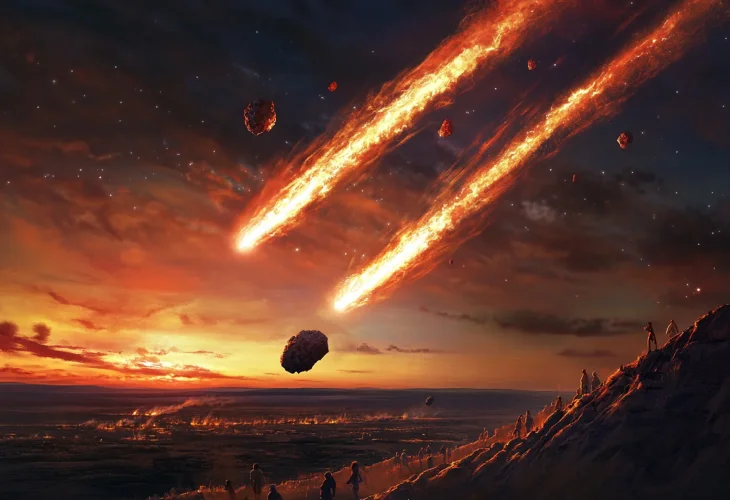Issues in the Bible
Stones from the Sky: The Day the Sun Stood Still and the Science Behind It
How ancient witnesses, forgotten chronicles, and modern discoveries of meteorites all point to a single extraordinary event remembered around the world

Can stones really fall from the sky? The Bible says they can. In the Book of Yehoshua (Joshua), we read: “And it came to pass, as they fled from before Israel, while they were in the descent of Beth-Horon, that the Lord cast down great stones from heaven upon them unto Azekah, and they died. There were more who died from the hailstones than those whom the Children of Israel slew with the sword.” (Yehoshua 10:11)
You can see the descent of Beth-Horon today to your right as you ascend to Jerusalem on Highway 443. There are several theories identifying these “stones,” but what did people throughout history think about the idea of stones falling from heaven?
Aristotle’s Denial: “It Cannot Be”
Aristotle, who never knew the Book of Yehoshua, addressed a similar report from his own time — that in the city of Aegospotami, stones had fallen from the sky. His response was firm: “Such a thing is impossible.”
According to Aristotle, the heavens contain no stones or rocks, since all celestial bodies are made of a unique, perfect substance — utterly different from anything found on Earth.
If the heavens were composed of the same materials as Earth, he argued, their elements would not remain suspended in the air; they would fall.
It was elegant reasoning — and wrong. But Aristotle’s view held sway for nearly two thousand years. Reports of stones falling from the sky continued to appear — yet scholars dismissed them all as superstition or error.
When the Heavens Proved Them Wrong
On November 7, 1492, Emperor Maximilian I and his entourage witnessed a meteor shower in Ensisheim, Alsace, where stones truly fell from the sky. Still, the scholars of the day waved it off — “stones blown by the wind,” they claimed.
Then, on July 24, 1790, in southwestern France, another shower of stones fell from the heavens. The French Academy of Sciences declared confidently: “Such a phenomenon is physically impossible. Therefore, it did not occur.”
It wasn’t until 1803, after yet another meteorite shower — this one carefully studied by the scientist Jean-Baptiste Biot of the very same academy, that the truth was finally accepted.
Scientists could no longer deny it: Rocks really do fall from space.
There are stones wandering through the heavens that occasionally reach Earth — what we now call meteorites.
Echoes from the Ancient World
Accounts of such events existed long before modern science. Texts dating to the era of Yehoshua ben Nun describe the same phenomenon:
A Sumerian text tells of a “rain of stones as large as trees.”
An ancient Central American record speaks of a “rain of fire and burning stones.”
If we attempt to date these descriptions, the timing aligns remarkably with the biblical event in Yehoshua — the day the sun and moon stood still.
Such a cosmic event, if literal, would have affected the entire planet, not only the battlefield in Canaan. Indeed, traditions from across the globe describe what seems to be the same occurrence.
A Night That Would Not End
In the ancient history of Culhuacan (in what is now Mexico), records tell of a time when night lasted unusually long — when light was withheld from the world for an extra night.
If we compare this to the account in Yehoshua — where the sun stood still over Israel and prolonged the day, it makes perfect sense:
While Israel experienced a long day, the other side of the globe experienced an extended night.
Other Mesoamerican traditions say the same. The Spanish scholar Bernardino de Sahagún documented Native American legends recalling the moment when “the moon, too, stood still.”
These ancient peoples had no knowledge of the Bible, yet their oral histories echo its descriptions. They were simply preserving the stories of their ancestors — and, astonishingly, those stories align with the biblical account of Yehoshua's miraculous battle.

